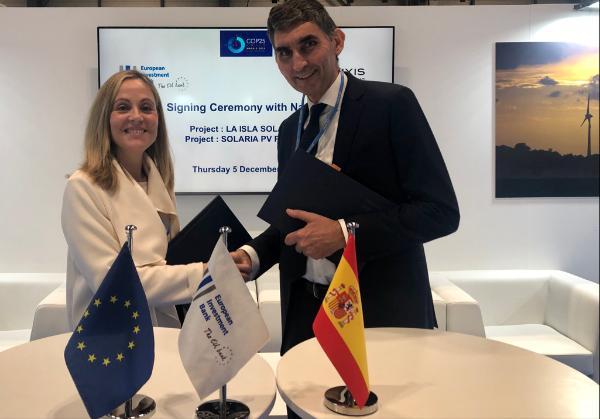
- The EU bank will provide EUR 66m to Natixis to co-finance the construction of two complexes with a total capacity of 436 MW
- The two new renewable energy projects will help create up to 700 jobs during the implementation phase
- The solar power plants will be in the provinces of Seville, Cáceres, Valladolid, Salamanca and Huesca
During the Climate Change Conference in Madrid, the European Investment Bank (EIB) signed two major agreements for promoting renewable energy in Spain. The EIB, which has expanded its climate action to become the EU climate bank, will provide EUR 66m to financing and investment bank Natixis to support the implementation of two photovoltaic solar energy projects in Spain. Both projects will help Spain reach its goal of ensuring that 42% of the energy it uses comes from renewable sources by 2030, as set out in the National Energy Plan. The agreement was signed at COP25 by the EIB Vice-President responsible for climate action, Emma Navarro, and Natixis’ most senior representative in Spain, Jean-Philippe Adam.
Eight solar power plants in Extremadura, Aragón and Castilla y León
Firstly, the EIB will provide EUR 25m to Natixis to build eight solar power plants with a capacity of 254 MW. It will generate 438 GWh of electricity a year from photovoltaic energy, avoiding the release of 204 000 tonnes of CO2 into the atmosphere. Three of these plants will be in the municipality of Tordesillas, in Valladolid. Three further plants will be built in Salamanca (two in Valdelosa and one in Palacios del Arzobispo), another in the municipality of Casatejada in Cáceres, and lastly one in Huesca, in the municipality of Poleñino. The project involves employing 400 people during the implementation phase and 50 on a permanent basis.
The plants are owned by Solaria Energía y Medio Ambiente S.A, which is also the developer, builder and operator. Solaria is a Spanish company specialised in the photovoltaic sector, and was among the successful bidders in the auction for new renewable electrical energy production facilities held in Spain in July 2017.
Solar power in Andalusia
The second solar power project supported by the EIB will be in Alcalá de Guadaira, Seville, with the EU bank providing EUR 41m to Natixis to finance its construction. The project promoter is Spanish company Novasol Invest La Isla, which is located in Seville and was also a successful bidder in the 2017 renewable energy auction.
This complex will have a total capacity of over 182 MW and will be capable of generating 341 GWh of electricity a year without producing polluting emissions of any kind, while helping to prevent the release of 127 000 tonnes of CO2. The project will also have a positive impact on jobs, as it will make it possible to employ 300 people in Andalusia during the implementation phase and 40 on a permanent basis to operate the plant.
At the signing ceremony during the COP25 Climate Change Conference at IFEMA in Madrid, EIB Vice-President Emma Navarro, who is responsible for the Bank's climate action and its activities in Spain, highlighted the positive impact of both projects on helping to achieve the EU's climate targets, “ambitious goals to which the EIB will make a substantial contribution by mobilising up to EUR 1tn in financing to promote the transition to a new economic model. Spain is being asked to play a key role in the transition to a low-carbon economy. Projects like this demonstrate the direct positive impact of EIB activity on investments promoting clean energy in our country, while also helping to create jobs.”
Head of Natixis in Spain Jean Philippe Adam pointed out the important role of the financing in combating climate change, and Natixis’ active contribution to financing renewable assets across the globe. Natixis is the first financial company to actively manage the climate impact of its balance sheet, incorporating an unprecedented mechanism measuring the climate impact of each asset by applying a Green Weighting Factor.
The EIB and climate action
The EIB is among the world's largest multilateral providers of climate finance. The Bank's goal is to be a leader in mobilising the finance needed to keep global warming to under 2 ˚C and limit temperature rises to 1.5 ˚C to meet the Paris Agreement objectives. On 14 November, the EIB Board of Directors approved its new climate objectives and the new energy lending policy. The Bank will gradually increase its financing for climate and environmental objectives up to 50% by 2025, with the goal of ensuring that the EIB Group mobilises at least EUR 1tn by 2030 to promote investments helping to meet these objectives. It also announced its intention to align all EIB Group activities with the Paris Agreement. To this end, the EIB will cease financing fossil fuel-based projects from late 2021.
In 2018, the EIB provided almost EUR 1.3bn to support climate action in Spain by financing projects involving the development of cleaner means of transport and implementation of new, less polluting and more environmentally friendly production processes.
Natixis is a French multinational financial services firm specialised in asset and wealth management, corporate and investment banking, insurance and payments. A subsidiary of Groupe BPCE, the second largest banking group in France through its two retail banking networks, Banque Populaire and Caisse d’Epargne, Natixis counts nearly 16 000 employees across 38 countries. Its clients include corporations, financial institutions, sovereign and supranational organisations, as well as the customers of Groupe BPCE's networks. Listed on the Paris stock exchange, Natixis has a solid financial base with a CET1 capital under Basel 31 of EUR 11.4bn, a Basel 3 CET1 ratio1 of 11.5% and quality long-term ratings (Standard & Poor’s: A+, Moody’s: A1 and Fitch Ratings: A+).
1 Based on the CRR-CRD4 rules as reported on 26 June 2013, including the Danish compromise – without phase-in and including financial income from the current year and accumulated dividend (based on a 60% payment).
Figures at 30 September 2019.